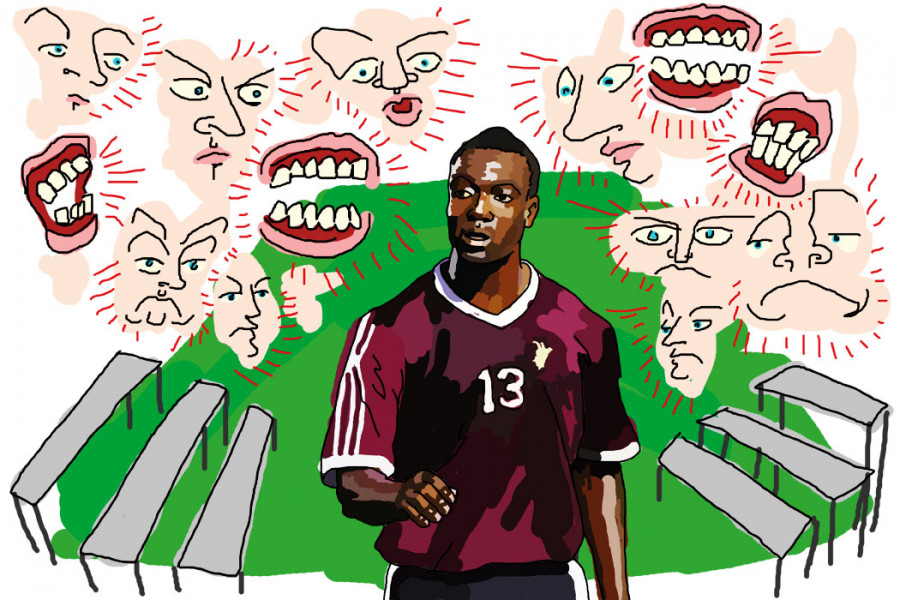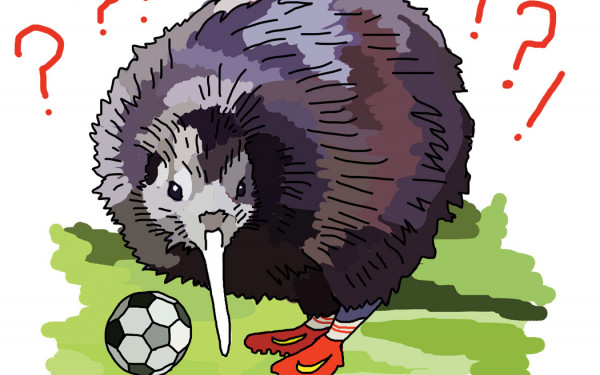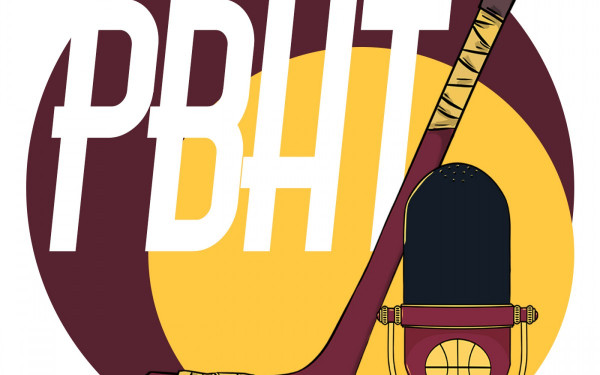Dribbling Through Discrimination
Despite Progress, Racism in Soccer Remains an Issue
When watching a high-quality game of soccer, it’s hard to imagine the struggles that players sometimes endure on the pitch—notably with the issue of racism. Despite initiatives from FIFA to eliminate racism from soccer, recent incidents have kept the topic on the world’s radar.
In February, Arrigo Sacchi, former manager for Italian club AC Milan, said that he felt there are “too many coloured players” on under-20 teams in Italy, simultaneously denying that he is a racist. Days later, Chelsea FC fans refused to let a black man on a metro while chanting, “We’re racist, we’re racist and that’s the way we like it.”
Racism is not exclusive to soccer’s major leagues. Players at any level can face discrimination by their peers.
Concordia Stingers men’s soccer player Odaine Demar played in Europe, where he was subject to racial discrimination.
“It wasn’t the best for me. My teammates weren’t as receptive as I thought, and my coach was kind of the same,” said Demar. “As time went on, little by little, signs started showing that it was more than not being receptive, it was more of a racial thing.”
Demar continued to receive verbal and racial abuse upon his return to Canada, a country not known as a soccer nation troubled by racism.
“The problem is most of the leagues do not really stand on their positions against racism.” – Francis Gilbert
The defender recounted a game he played in Ottawa against an Italian team. When the other team started losing, insults and racial slurs were thrown at Demar and his team.
Organizations such as the Front Commun Montreal, a progressive Montreal Impact fan group which stands against racism, sexism, and homophobia, is working hard at eradicating these situations from the game of soccer.
“[We] try to sensitize [people] against the repression made by the league, but also other actions we sometimes do are related to working conditions,” said Francis Gilbert, a member of Front Commun Montreal. “We made a banner in support of the referees; they had a problem with their working conditions.”
Established in 2012, the group consists of Montreal Impact season ticket holders who sit in section 131 and 132 of the Saputo Stadium.
“The idea is to have a team that looks like the city, or looks like our ideas,” said Gilbert.
Front Commun Montreal appears at every home Impact game to try to educate and sensitize people to the aforementioned issues, which continue to exist in soccer.
Gilbert feels that Montreal, despite its multicultural image, still has ways to go in the fight for racial tolerance in soccer, but that it isn’t as significant an issue in comparison to other cities and countries.
“We think that in Montreal, racism is kind of a problem,” said Gilbert. “We will not say that it’s a major problem but we want to stand by in Montreal and say that it’s no place for racism.
“It’s easier when you have Patrice Bernier, one of the most [well-known] players and he’s black, so he’s easy to [use as] an example to people.”
“I’ve never really heard of anything much [in terms of racism] in Montreal but I definitely see that it’s a very multicultural city and things seem to be fine here,” Demar said.
However, both Demar and Gilbert believe there’s more to be done in terms of extinguishing racism from soccer-mad continents like Europe. Demar feels that heavier punishments are necessary in order for players to understand that soccer should have no tolerance for racial incidents.
“The problem is most of the leagues do not really stand on their positions against racism,” said Gilbert. “It would be good if the club was giving information about [racism] and why we should criticize racism.”
“I remember there was one incident with England and Serbia that happened and a big brawl broke out,” said Demar. “Then [the official response was] like, ‘pay a couple thousand dollars, and you guys are banned for a week.’
“It’s not just on FIFA, it’s not just on [FIFA president] Sepp Blatter putting down his hammer saying ‘you’re suspended, you’re fined,’” Demar added. “It has to be everyone, the supporters, the players. Everyone has to have their own little ways of getting together and trying to stamp it out.”





1web_600_375_90_s_c1.jpg)
_600_375_90_s_c1.jpg)
